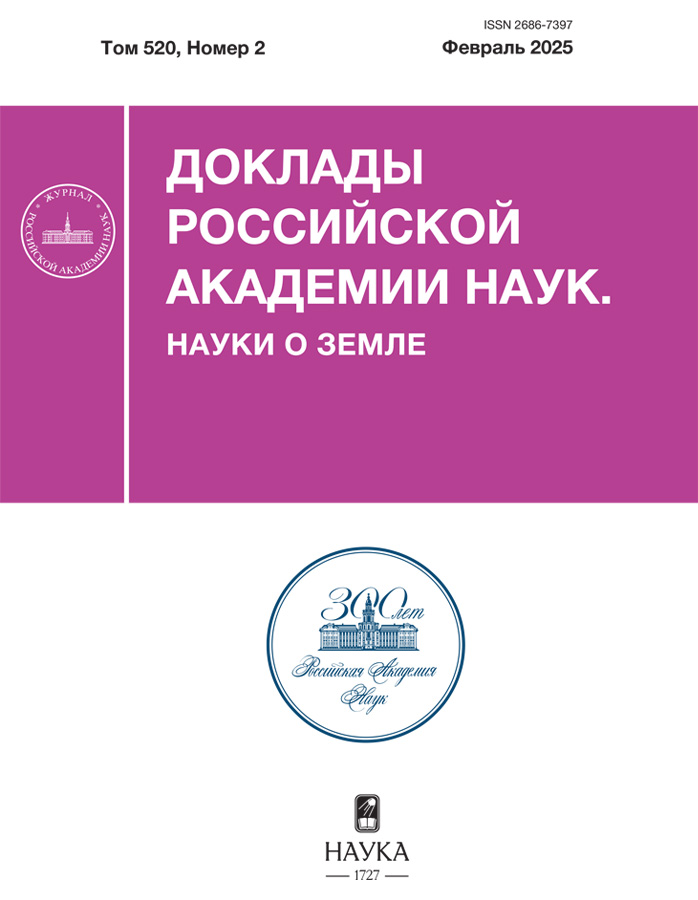HUMIC SUBSTANCES AND VISCOSITY OF SOIL PASTES
- Authors: Fedotov G.N.1, Shoba S.A.1, Ushkova D.A.1, Gorepekin I.V.1, Salimgareeva O.A.1, Potapov D.I.1
-
Affiliations:
- Lomonosov Moscow State University
- Issue: Vol 511, No 1 (2023)
- Pages: 119-123
- Section: GEOGRAPHY
- Submitted: 30.01.2025
- Published: 01.07.2023
- URL: https://permmedjournal.ru/2686-7397/article/view/649880
- DOI: https://doi.org/10.31857/S2686739723600285
- EDN: https://elibrary.ru/RXRQHN
- ID: 649880
Cite item
Abstract
In the work, the influence of water content in soil pastes on their viscosity was studied by the method of vibrational viscometry and changes in viscosity were explained from the standpoint of the structural organization of humic substances (HS) of soils. It was found that the viscosity of pastes prepared from sod-podzolic soil, with a decrease in their water content below 36%, increases to values of 4000–4200 MPa sec, and then practically does not change. This contradicted the existing ideas about the viscosity of suspensions, which should continuously increase with a decrease in the water content in them. This phenomenon was explained from the standpoint of the presence in the soil paste another component in addition to water and soil particles (aggregates and microaggregates) – supramolecular formations (SF) from soil HS, which can separate from soil gels and pass into a dispersion medium. According to the literature data, SF of HS exist in soils in the form of fractal clusters (F-clusters) consisting of particles-molecules. Due to the high stability of F-clusters, it is possible to assume that soil particles sliding along F-clusters in pastes, and a change in the thickness of the F-cluster layer through which sliding occurs may not significantly influence the viscosity of soil pastes. The data obtained during the study of the viscosity of soil pastes confirm the importance of F-clusters in the occurrence of soil properties.
About the authors
G. N. Fedotov
Lomonosov Moscow State University
Author for correspondence.
Email: gennadiy.fedotov@gmail.com
Russian Federation, Moscow
S. A. Shoba
Lomonosov Moscow State University
Email: gennadiy.fedotov@gmail.com
Russian Federation, Moscow
D. A. Ushkova
Lomonosov Moscow State University
Email: gennadiy.fedotov@gmail.com
Russian Federation, Moscow
I. V. Gorepekin
Lomonosov Moscow State University
Email: gennadiy.fedotov@gmail.com
Russian Federation, Moscow
O. A. Salimgareeva
Lomonosov Moscow State University
Email: gennadiy.fedotov@gmail.com
Russian Federation, Moscow
D. I. Potapov
Lomonosov Moscow State University
Email: gennadiy.fedotov@gmail.com
Russian Federation, Moscow
References
- Бибик Е.Е. Реология дисперсных систем. Л.: ЛГУ, 1981. 172 с.
- Фролов Ю.Г. Структурообразование в дисперсных системах. Реологические свойства структур. М.: МХТИ, 1980. 63 с.
- Тюлин А.Ф. Органно-минеральные коллоиды в почве, их генезис и значение для корневого питания высших растений. М.: АН СССР, 1958. 52 с.
- Горбунов Н.И., Абрукова Л.П. Реологические свойства и минералогический состав слитых почв // Почвоведение. 1974. № 8. С. 74–85.
- Фролов Ю.Г. Курс коллоидной химии. Химия. 1982. 463 с.
- Шоба С.А., Потапов Д.И., Горепекин И.В., Ушкова Д.А., Грачева Т.А., Федотов Г.Н. Состояние почвенных гелей при разной пробоподготовке к вискозиметрии образцов дерново-подзолистой почвы // Доклады РАН. Науки о жизни. 2022. Т. 504. С. 240‒244.
- Евдокимов И.П., Лосев А.П. Природные нанообъекты в нефтегазовых средах М.: РГУ нефти и газа им. И.М. Губкина, 2008. 104 с.
- Fasurova N., Cechlovska H., Kucerik J. A comparative study of South Moravian lignite and standard IHSS humic acids’ optical and colloidal properties. Petroleum and Coal. 2006. 48(2): 24–32.
- Rice J.A., Lin J.S. (1993). Fractal nature of humic materials // Environ. Sci. Technol. 1993. 27. P. 413–414.
- Senesi N., Rizzi F.R., Dellino P., Acquafredda P. Fractal dimension of humic acids in aqueous suspension as a function of pH and time // Soil Science Society of Am. J. 1996. V. 60. № 6. P. 1613–1678.
- Osterberg R., Mortensen K. Fractal dimension of humic acids. A small angle neutron scattering study // European Biophysics J. 1992. V. 21 (3). P. 163–167.
- Senesi N., Rizzi F.R., Dellino P., Acquafredda P. Fractal humic acids in aqueous suspensions at various concentrations, ionic strengths, and pH values. Colloids and Surfaces A. // Physicochemical and Engineering Aspects. 1997. V. 127. Iss. 1–3. P. 57–68.
- Федотов Г.Н., Добровольский Г.В. Возможные пути формирования нано- и микроструктур в гумусовых веществах почвенных гелей // Почвоведение. 2012. № 8. С. 908‒920.
- Милановский Е.Ю. Гумусовые вещества почв как природные гидрофобно-гидрофильные соединения. М.: ГЕОС, 2009. 186 с.
Supplementary files













